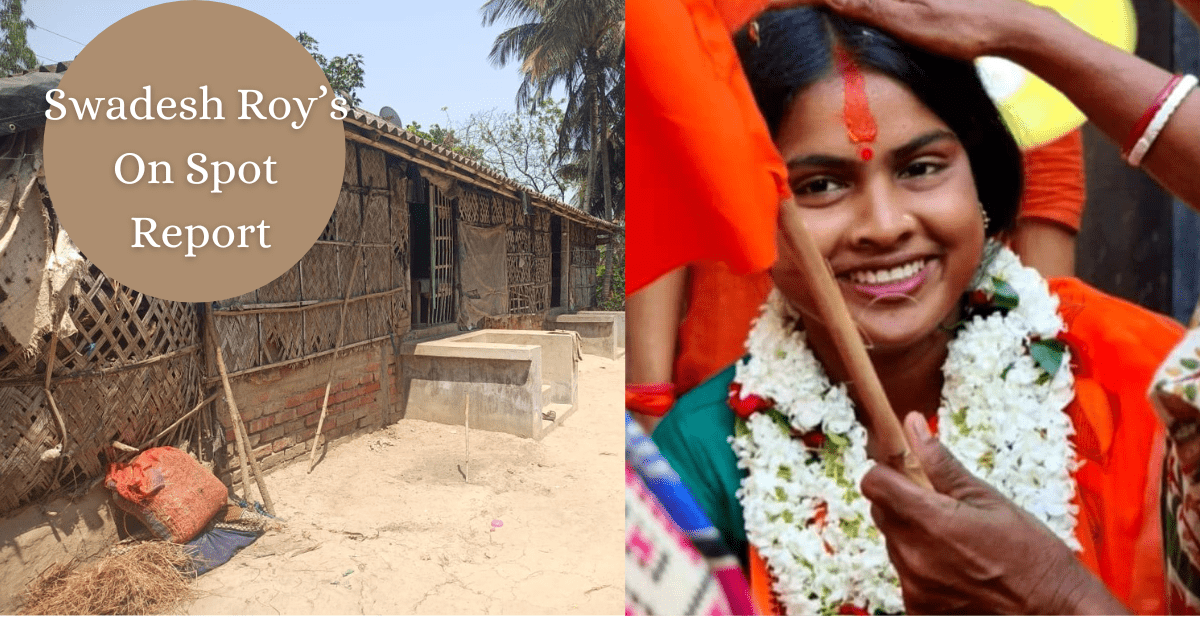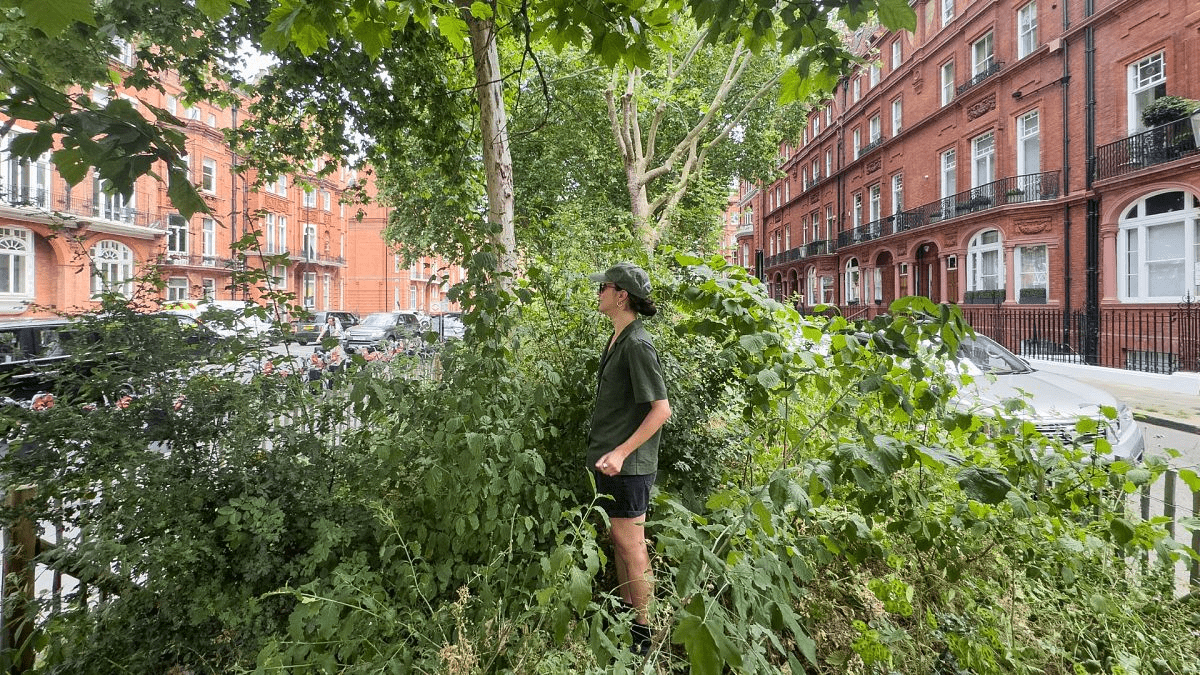Two blue polythene bags and two torn polythene bags from the vegetable market are tied to a thin bamboo fence. A slightly thicker black polythene, which lets light easily pass through the gaps in the fence, is also attached for some protection against sun and rain. It also serves the purpose of a door. Unable to afford more polythene, an old cloth is hung up instead, serving as a door and part of the fence. Moving the cloth aside reveals a simple wooden bed covered with cheap fabric and a pillow. Her husband works as a migrant laborer in Tamil Nadu.
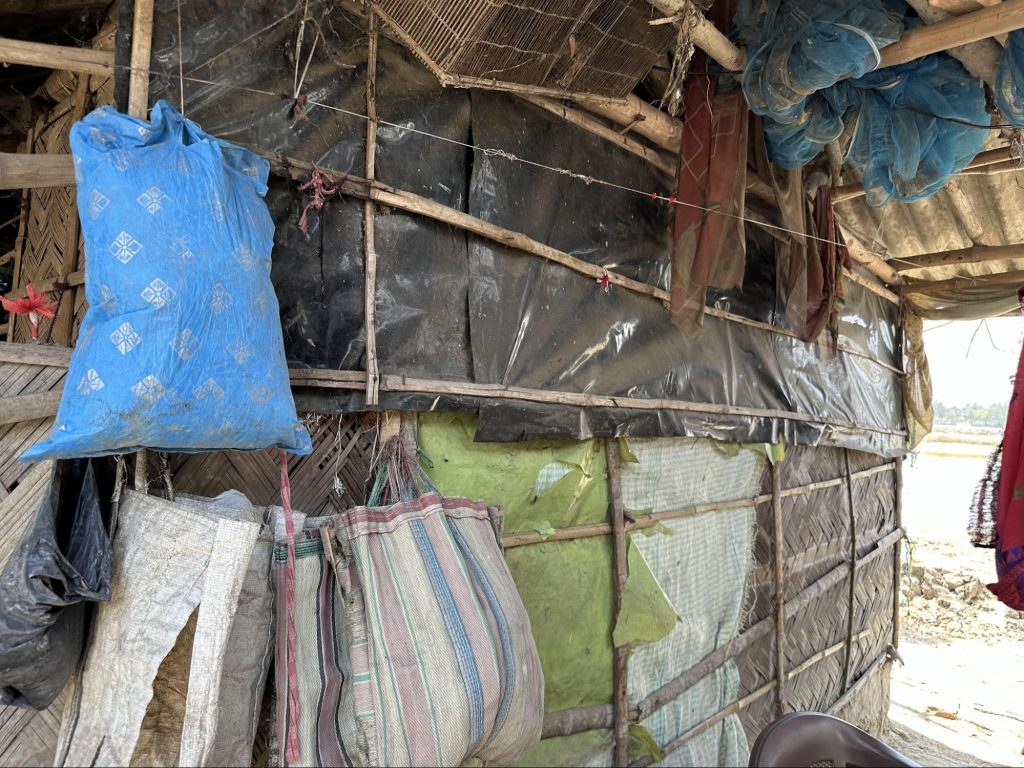
In front of Rekha Patra’s humble home.
The interior holds a few steel bowls, two small plastic baskets, several glass bottles and jars, and an old bicycle. Hanging from the handle of the bicycle is an extremely cheap women’s handbag, which can be found for less than 50 Bangladeshi Taka—roughly less than half a US dollar—on the sidewalks of Dhaka.
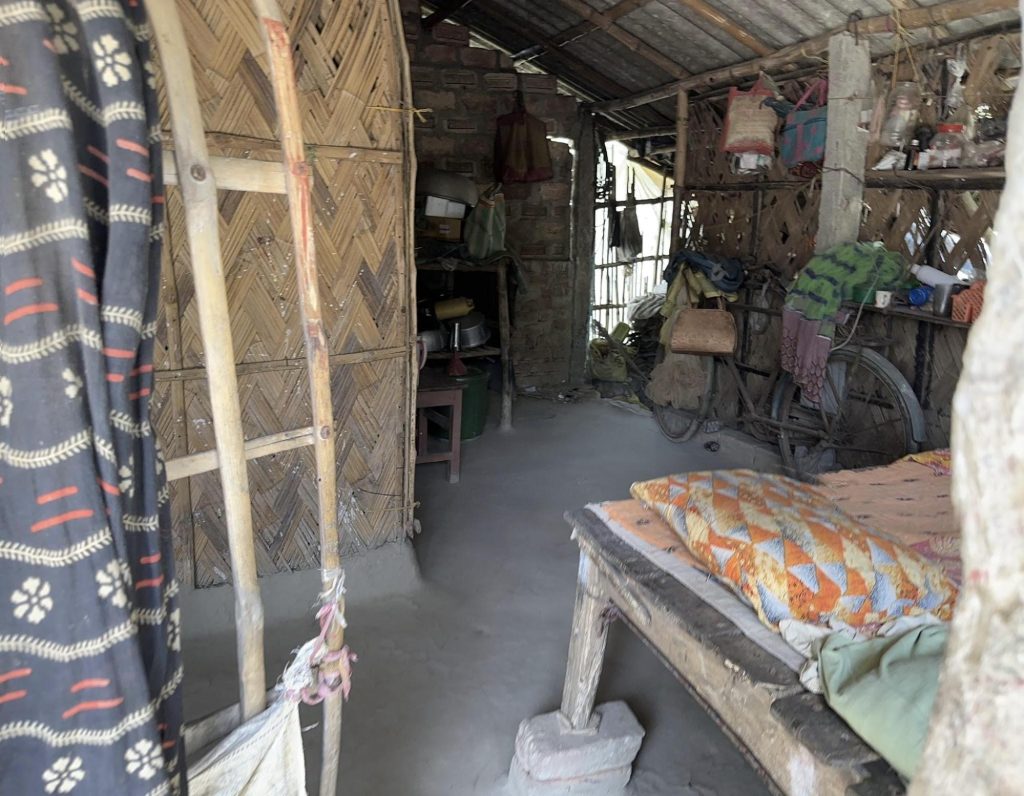
Inside of Rekha Patra’s humble home.
Additionally, inside Rekha Patra’s home, there are two inexpensive saris, which would never cost more than 150 Bangladeshi Taka (slightly more than 1 US dollar) each at the sidewalk markets of Dhaka. There is also a net, used as a mosquito net at night and doubles as a fishing net during the day.

Rekha Patra, the housewife of this humble dwelling, lives on an island or polder named Sandeshkhali, located about 75.9 kilometers from Kolkata, the capital of West Bengal state in India. Rekha Patra has recently received the nomination from the ruling party, BJP, to contest from the Basirhat center in West Bengal.
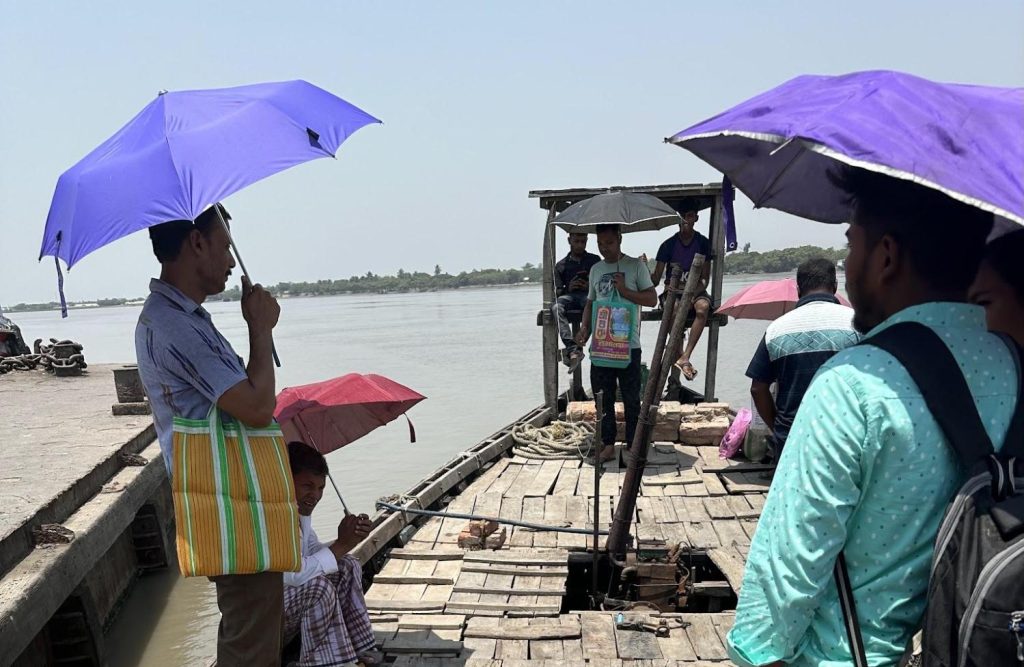
An engine-powered boat on the Boro Kolagachi River.
Sandeshkhali,” and “Rekha Patra”
After receiving the nomination, the terms “elections,” “Sandeshkhali,” and “Rekha Patra” have gradually become almost synonymous in India. Rekha Patra’s name is now frequently mentioned in international media. Not only in the news but in any talk show in India—no matter how prominent the speakers are or what language it is conducted in—Sandeshkhali and Rekha Patra are invariably mentioned. Initially, Sandeshkhali and Rekha Patra were just suddenly prominent names in the context of the West Bengal elections.
 Mamata Banarjee
Mamata Banarjee
Gradually, Sandeshkhali and Rekha Patra have become focal points in the elections of a country with 1.4 billion people and 970 million voters, surpassing many national leaders in media mentions. Rekha Patra’s name is repeatedly highlighted, from Murshidabad to Jalpaiguri in West Bengal, among the general populace as well as in the posh clubs of Kolkata during high-middle-class dinner discussions. Her prominence in conversation matches, if not exceeds, that of West Bengal’s most recognized leader, Mamata Banerjee.
 Patra is bringing in Women’s Votes
Patra is bringing in Women’s Votes
Voting has already taken place in Jalpaiguri, while places like Kolkata, Barasat, and Baharampur are yet to go to the polls. In these areas, many well-respected women involved in everyday work or holding important positions mostly agree that Mamata Banerjee has a strong female voter base in West Bengal, which Rekha Patra might shake up this time.
This sentiment aligns closely with the views expressed by a former prominent editor in West Bengal. Referring to him simply as an editor would be an understatement—he evolved from a dogged reporter to an editor and became an institution in himself, known for his conciseness. In a light-hearted moment during lunch, he remarked, “Let’s see if the BJP ends up performing the best in West Bengal after all?” This comment correlates with the notion that Rekha Patra’s candidacy could significantly impact Mamata’s traditionally strong female voter base.
The Challenges of Sandeshkhali’s Geography and History
The choto-kolagachi River lies next to the sea, where the future of this port was questioned during a sea survey, halting development. From Canning, one can travel to Basanti in a few small-sized launches. Beyond that, hand-operated boats are the only means of transport. To reach Sandeshkhali on the bank of the boro-kolagachii River, one must cross the big river.

Choto-Kolagachi River
The choto-kolagachi River lies next to the sea, where the future of this port was questioned during a sea survey, halting development. From Canning, one can travel to Basanti in a few small-sized launches. Beyond that, hand-operated boats are the only means of transport. To reach Sandeshkhali on the bank of the boro-kolagachii River, one must cross the big river.
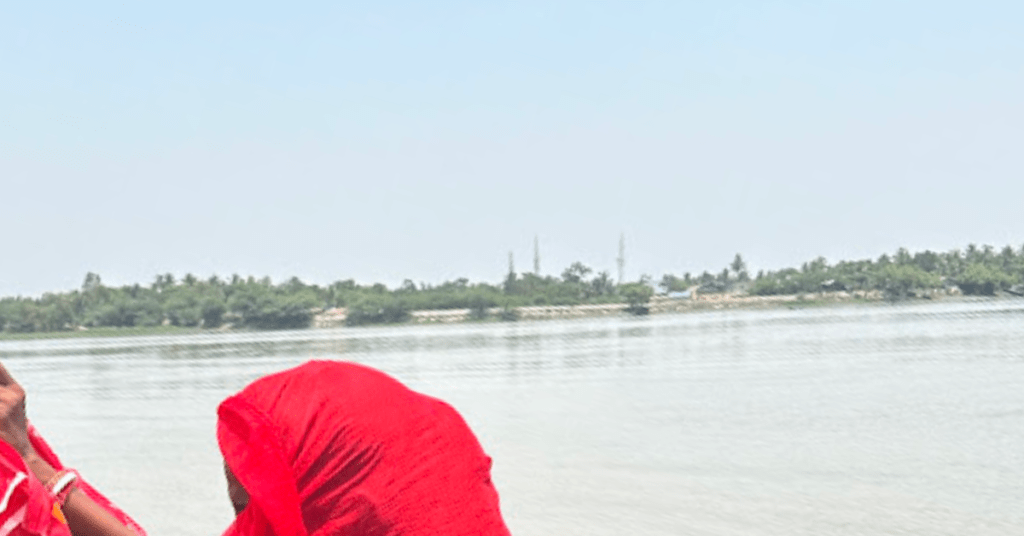
Boro-Kolagachi River
It is unclear if there were many settlements by the boro-kolagachi River before the partition of Bengal in 1947. In the 1960s, I saw mainly this island or polder surrounded by rivers carried by the Sundarbans, primarily enclosed by the boro-kolagachi River and the choto-kolagachi River. The island was densely covered with Goran forest, some Sundari trees, and beautiful forests filled with Ura, Keora, and Gewa trees. Refugees from East Bengal began to settle there, cutting down the trees and building a few houses.
Changes in the Landscape of Sandeshkhali

By the paved road of Sandeshkhali,
Near the Pond, after more than five decades, no traces of Goran, Sundari, or Gewa trees were found. A small market has developed, along with paved roads. The area is still referred to as Edo Pond. At the Sandeshkhali ferry terminal, vehicles must be parked, and crossing is done using an engine-powered boat. The main mode of transport in Sandeshkhali remains battery-operated rickshaws. The entire stretch of paved road there can be covered in a rickshaw for no more than 100 rupees. A rickshaw driver is happy to earn 200 rupees for half a day’s work, indicating limited earning opportunities. Even on the scorchingly hot 29th of April at the ferry terminal, very few people were seen buying coconuts, watermelons, cucumbers, or bananas. In about half an hour, only four bananas were sold.

The farmer’s biggest asset is the goat
By the paved road of Sandeshkhali, near the Edo Pond, after more than five decades, no traces of Goran, Sundari, or Gewa trees were found. A small market has developed, along with paved roads. The area is still referred to as Edo Pond. At the Sandeshkhali ferry terminal, vehicles must be parked, and crossing is done using an engine-powered boat. The main mode of transport in Sandeshkhali remains battery-operated rickshaws. The entire stretch of paved road there can be covered in a rickshaw for no more than 100 rupees. A rickshaw driver is happy to earn 200 rupees for half a day’s work, indicating limited earning opportunities. Even on the scorchingly hot 29th of April at the ferry terminal, very few people were seen buying coconuts, watermelons, cucumbers, or bananas. In about half an hour, only four bananas were sold.
Economic and Environmental Challenges
By the small paved road near the Pond, the water decreases in the heat and turns a bluish-dirty color due to algae. Unlike wealthy farming families who keep their pond water clean, no such maintenance is seen here. Despite a few homes having tube wells, many are seen bathing in the Edo Pond. Most of the houses lack maintenance, with broken roofs or fences. The fact that residents of this polder own just a goat or a cow as livestock shows that the people here are not well-off.
Land and Livelihood Issues ppl o
Rekha Patra’s father-in-law explained that the Left Front government had permanently allotted them land and homes on this polder or island. The land was very fertile and produced good crops, not just at his home but also in neighboring homes, which had mango, blackberry, and various other fruit trees. The ponds also had good fish. They led a decent life relying on the crops, vegetables, and fruits grown at home.

Dried up Ponds
While pointing behind him where he was standing under a patchily roofed structure next to his broken home, he showed that some of the soil in the pond had cracked and was enclosed by embankments, some of which still had water. When asked about it, he said, ‘This is our main problem. This land in front and behind my house belongs to my family, yet fish farming is being forcefully conducted here. Similarly, fish ponds have been forcefully constructed on everyone’s land around here. Now that you are here, in the rainy season, my courtyard sometimes has water up to the knees, sometimes up to the waist, because they build embankments for fish farming and do not allow the water to drain.’
When asked who ‘they’ are, he explained, ‘They are all people from the ruling party, not the central government of India, but the state government of West Bengal, from the Trinamool party. Their leader, Sheikh Shahjahan, and his people have taken over our land for fish farming. They also excavate our land’s soil to make bricks, yet they pay us no money. The rule is that if someone farms fish on someone else’s land, they must pay a fee proportional to the land’s size. But they don’t pay.’

Some Fisheries used by the People
Embanked Fish Ponds and Silent Voices
As he is the father-in-law of a BJP candidate, verifying the truth of his statements becomes essential. When three battery-operated rickshaw drivers were asked about this, two mentioned that despite promises of payment, none is given; instead, there is mistreatment. One remained silent. A fruit vendor near Dhamaghat ferry was also asked but he avoided the topic, stating he just minds his store and stays out of politics.
Silence Among the Community
Insight into why many remain silent was gathered from a conversation with a pharmacy owner at the bus stand before going to the Sandeshkhali ferry. He claims to be a doctor, although he also works as a painter, and practices medicine based on the knowledge gained while selling medicines. He mentioned that not many medicines are sold at his pharmacy. Even if a qualified doctor were employed there, there wouldn’t be enough patients who could afford fees. His economic condition is also not good, which is evident as he received an offer to find work in Kolkata. Amidst this conversation, he mentioned that even though Sheikh Shahjahan might not be present, his people are still around, working covertly. This doctor, Sheikh Yusuf, hopes that Rekha Patra wins the election, noting that no MP has ever contested from a neglected place like Sandeshkhali; they always come from Basirhat.
Another statement he made was that although Sheikh Shahjahan and his team (Trinamool Congress) have committed oppression and injustice, Shahjahan himself got into trouble competing at a higher level. When asked what this ‘higher place’ was, he avoided the question.
Other Injustices Besides Land Grabbing
The other injustices that enraged people are spoken about, but nobody explicitly names who the victims are, though they acknowledge it indirectly. For instance, when asked if Rekha Patra was a victim herself, one individual named Pradeep said he didn’t know. However, he repeatedly witnessed her protesting on behalf of the victims, holding her young child.
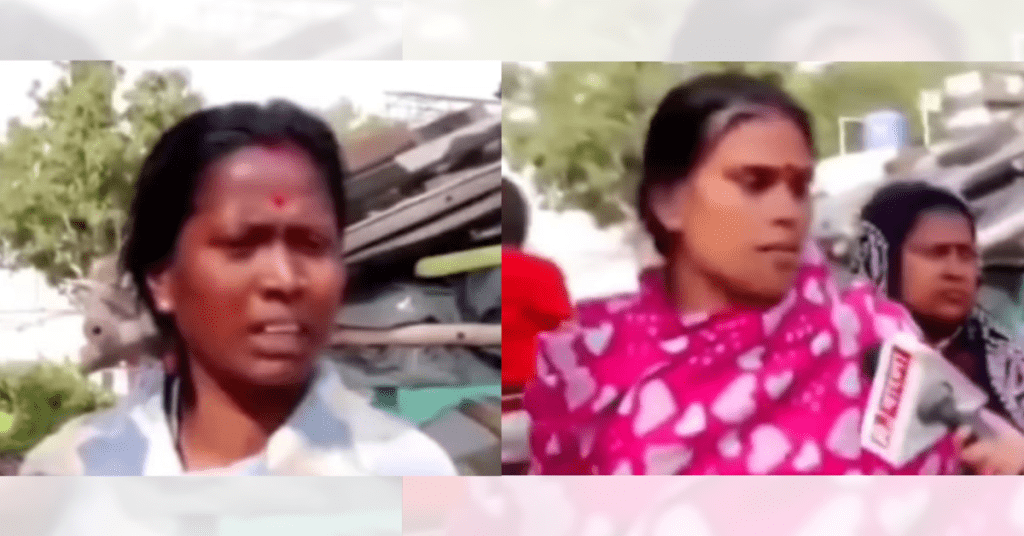
Concerns About Women’s Modesty Discussed in the Media
The victims have been vaguely identified over a long period. In a video, the first respectable lady states, “People from the Trinamool Congress party first come to see which house has a beautiful and younger wife. Then the threats start, ‘Leave your wife, you can be a husband, but you have no rights.’ They take her away for nights on end, not just for one day, but until they are satisfied.” Another person in the video says, “The party people would come and then take them away at night.”
Leaders and activists of the Trinamool Congress in West Bengal say this is propaganda against them, perpetrated by the BJP. However, when speaking with ordinary people of Sandeshkhali—passersby, battery rickshaw drivers, grocery shop owners, and customers—they mention incidents that are generally unspoken of. Many quietly move away and do not respond to questions.
Is State Power Only About Force?
State power is somewhat to blame, as noted after an incident at a Sandeshkhali party office where a girl was raped and died. The Chief Minister of the state, Mamata Banerjee, mentioned that the girl’s character and whether she was pregnant needed to be examined. This statement was highlighted as deeply regressive in an editorial by Anandabazar Patrika, whose current editor is a woman. At the time, people outside the country and from other states in India couldn’t understand what was really happening on that island or polder.
However, the question remains: did Mamata Banerjee truly say those words out of conviction, or was she compromised by the allure of power or some other form of influence?
What Other Powers Exist in the Sundarbans Region?
The novel “Gun Island” by Amitav Ghosh, published in 2019, sheds some light on other powers in the Sundarbans region. This area is a major human trafficking zone between Bangladesh and India and serves as a transit point for many other illicit activities. Observations over the past few years have shown that this Sundarbans area is a focal point of a large smuggling or trafficking network. From drugs to illegal labor and women trafficking, this route is used for various illicit activities including arms smuggling. Those involved in these activities possess significant amounts of black money outside their legitimate earnings. When politicians or leaders and their families get entangled with this money, those who control the black money become the most powerful in the state.

Sheikh Shahjahan owns many brick kilns
Sheikh Shahjahan owns many brick kilns and the vast Sheikh Shahjahan Market, revealing sources of his wealth. However, is his wealth confined only to these? Where does the money come from to support his large Rohingya force and numerous workers, who operate day and night?

Market of Sheikh Sahjahan
Rekha Patra is a housewife from a very ordinary, impoverished family. Her husband is a migrant worker in Tamil Nadu, and her brother-in-law, her husband’s elder brother, is a simple laborer. The family includes her brother-in-law and his wife, her father-in-law and mother-in-law, and the child of the house. From this, one can understand Rekha Patra’s circumstances and her perspective on life.
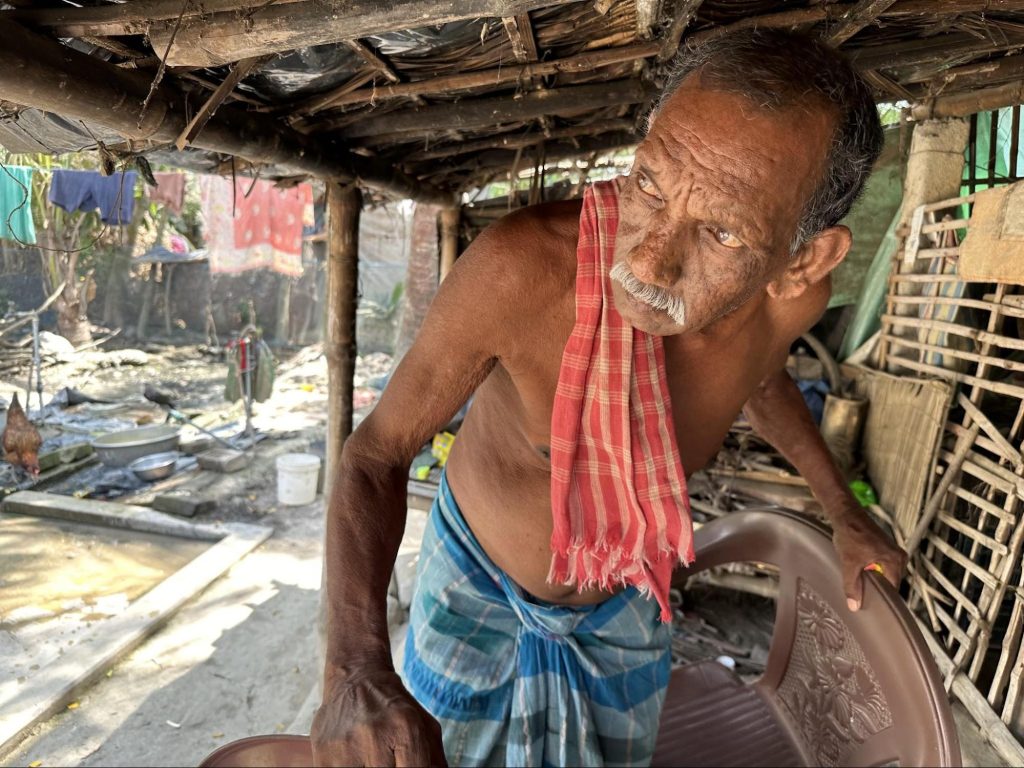
Rekha Patra’s father-in-law
Rekha Patra’s father-in-law observes that the lands in their area, used for agriculture, have been forcibly taken over. The land is used for fish farming, but no compensation is provided. Furthermore, the women in their area are harassed and their dignity is challenged by people from the party.
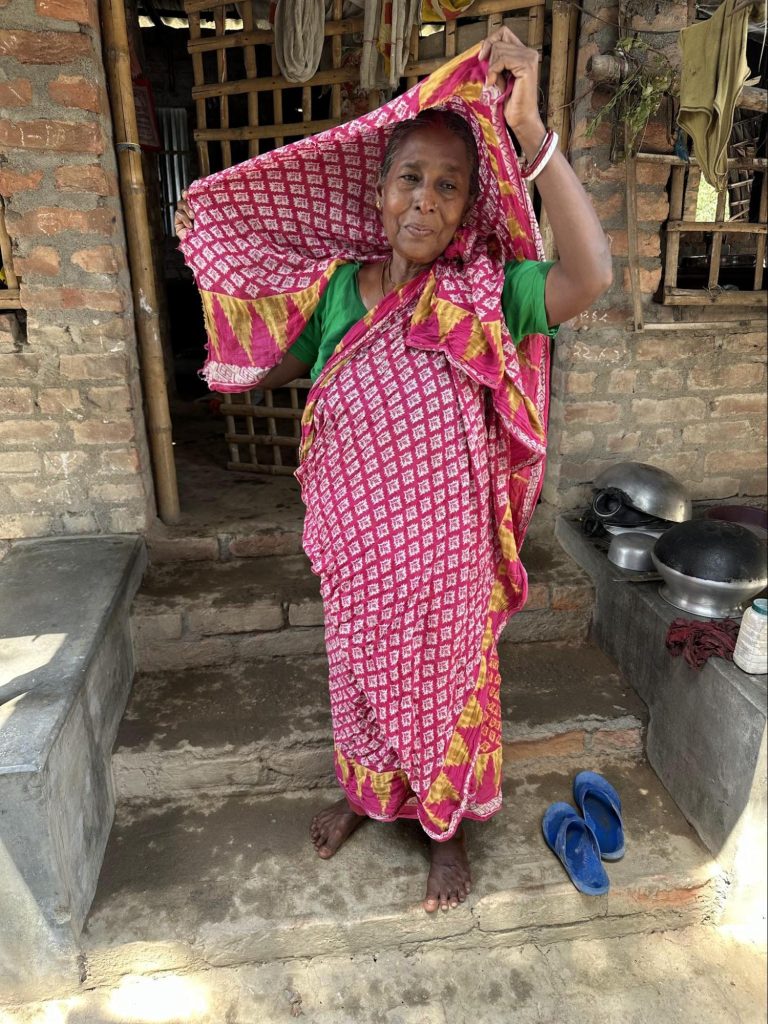
Rekha Patra’s mother-in-law
Rekha Patra’s mother-in-law is committed to resolving these issues if elected. However, upon crossing the Sandeshkhali ferry, many subtly hinted that Sheikh Shahjahan’s people are secretly united. Regardless of what happens to Shahjahan, his people remain influential outside, with their finances intact. They are likened to “men of the night sea,” while Rekha Patra is described as a beacon of daylight—a simple, hardworking Bengali housewife from an ordinary laborer’s family. Thus, her fight against these “men of the night sea” seems greatly uneven.
Yet, despite this disparity, emerging from her humble dwelling, she has become a prominent figure in the fight for women’s rights and dignity.
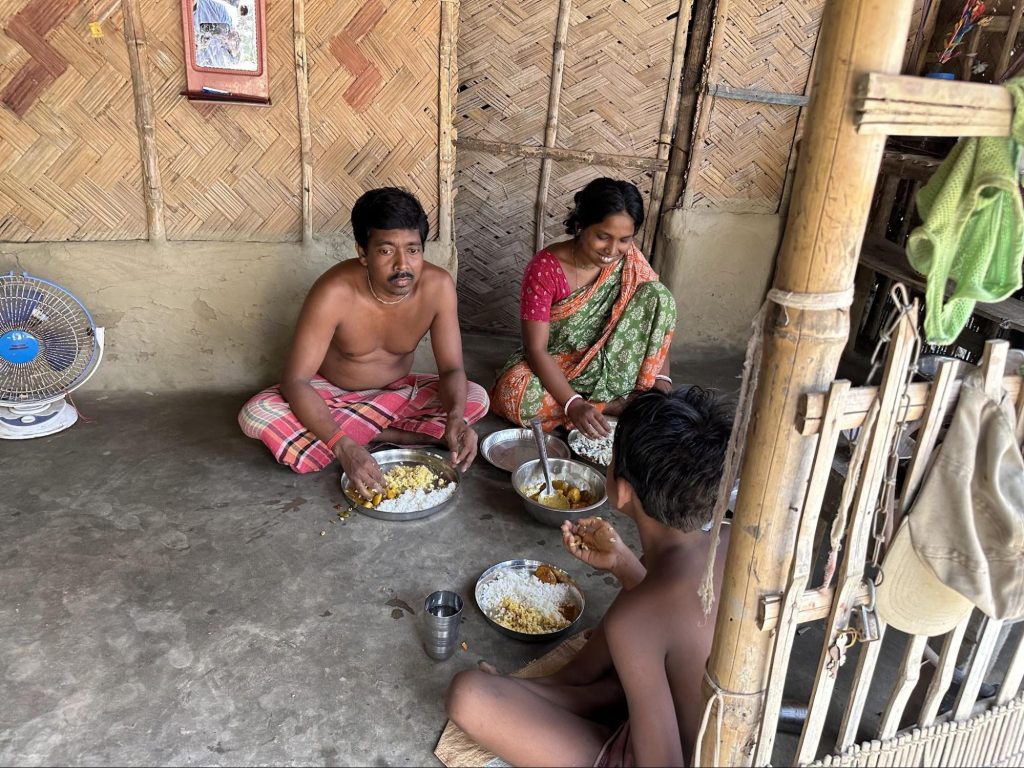
On the 29th, the elder brother of Rekha Patra’s husband was having lunch with his wife and their child.
Standing in front of their humble home as a journalist, it struck me how far a fire in such a small hut could spread, yet this girl is attracting more national and international journalists to her dilapidated home than the constituencies of Rahul Gandhi and Narendra Modi in the Indian elections.
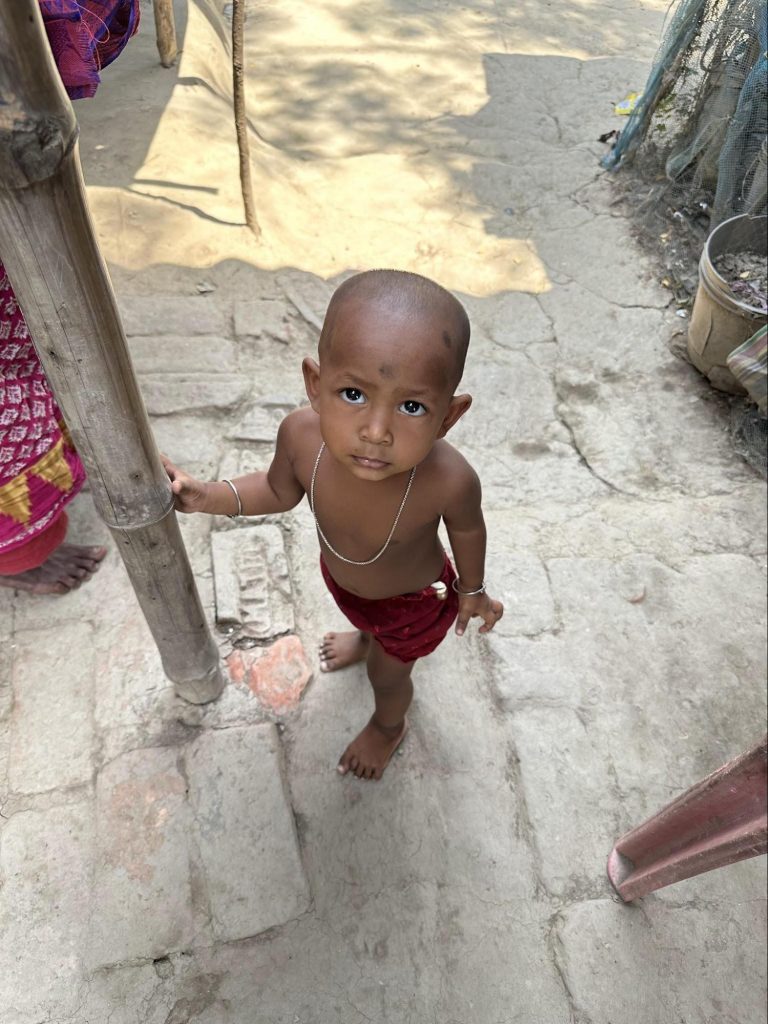
The child who has often been in her arms during protests has become a symbol of her steadfast commitment to her community’s cause.

